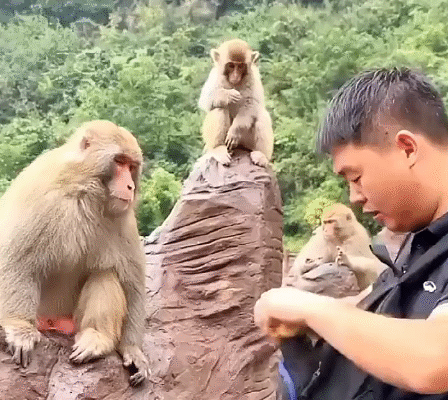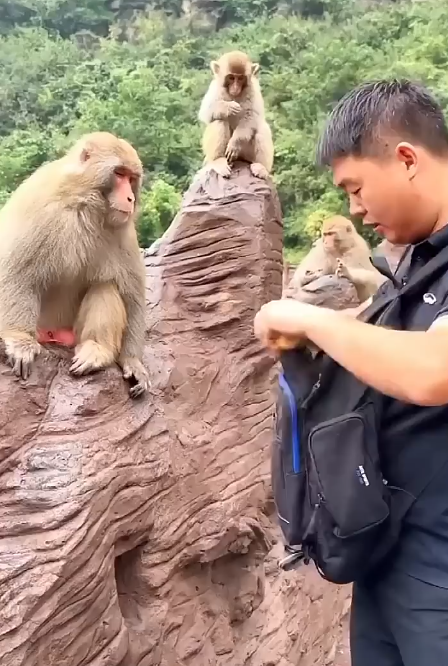
Once upon a time, deep within the dense jungles that lay at the edge of the human world, there lived a monkey unlike any other. His name was not given by his troop nor whispered in the rustle of the leaves—it was proclaimed, shouted, and demanded by the monkey himself. He was the Monkey King, the showman of the forest.
The Monkey King was not merely a leader by nature; he was a performer, a trickster, and a menace rolled into one. Where other monkeys swung gracefully between trees and foraged for fruits in silence, he strutted through the branches as though every vine were a stage curtain and every tree trunk his pedestal. His screeches echoed like laughter, and his pranks became infamous across the jungle.
But the Monkey King was also vicious. He delighted in making others uncomfortable, in turning his tricks into cruelty. If another monkey carried a handful of bananas, he would not just snatch them—he would throw them into the mud, laughing as the other went hungry. If a bird nested peacefully in the canopy, he would shake the branches until the eggs fell and cracked, simply to hear the cries of distress.
To the Monkey King, the forest was his audience, and every creature was a prop in his performance.
The Rise of a Showman
His antics drew attention not just from his troop, but from wandering humans who entered the jungle to gather firewood or herbs. From the shadows, the Monkey King would mimic their movements—scratching his head, pretending to walk upright, even stealing their baskets and running off with triumphant squeals.
Children who ventured close would laugh at his theatrics, but their laughter only fueled his arrogance. He performed cartwheels on tree branches, juggled stolen fruit, and even mimicked the sound of human laughter with uncanny precision.
Yet as funny as he appeared, his tricks always ended cruelly. A child’s toy, snatched and never returned. A fisherman’s bait, ruined and tossed into the river. A woodcutter’s lunch, stolen and eaten in front of him.
“Such a clever monkey,” the humans said, half amused, half afraid. But the elders of the village warned them:
“Do not cheer for him. Do not imitate him. For laughter at cruelty feeds a darker flame.”
The Turning Point
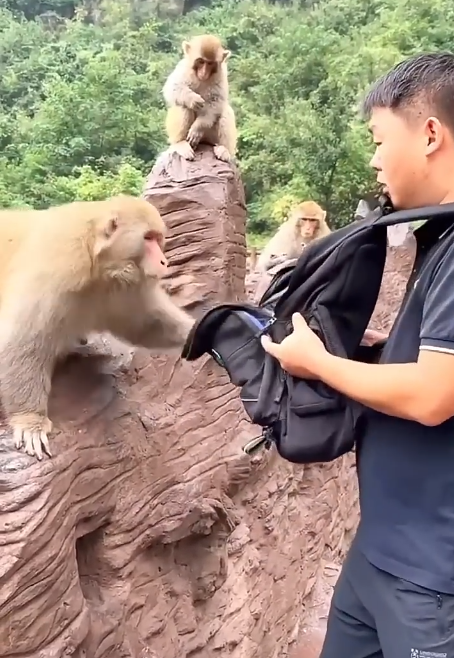
One fateful day, the Monkey King staged his grandest performance. A traveling circus passed through the village, with drummers, dancers, and fire-breathers. Curious, the Monkey King sneaked close and watched. His eyes widened at the sight of painted clowns, the roar of lions, and the dazzling feats of acrobats.
To him, this was paradise—humans had built an entire world of performance! He studied their tricks, memorized their moves, and when night fell, he returned to the jungle to imitate them.
But the Monkey King’s version was crueler, darker. He set dry leaves on fire, chasing terrified animals with the flames. He forced younger monkeys to balance on shaky branches, laughing when they slipped and fell. He screeched like a drummer, pounding on hollow logs until the whole forest seemed to tremble.
Soon, the jungle was no longer a peaceful home—it was a theater of chaos, ruled by his vicious shows.
The Spirit Awakens
The elders of the forest—the wise hornbill, the ancient python, and the gray-furred elder monkeys—gathered to discuss the chaos.
“This one brings suffering,” hissed the python.
“He has turned our harmony into mockery,” croaked the hornbill.
“He is no longer one of us,” sighed the elder monkey.
But before they could act, fate intervened.
The Monkey King, in his arrogance, decided to steal from the humans once more. This time, he crept into the village during a festival, drawn by the smell of roasted meat and the sound of drums. He leapt onto the stage, imitating the dancers and mocking their movements. At first, the crowd laughed—his mimicry was uncanny. But when he snatched the sacred offerings from the altar, scattering them into the dirt, the laughter turned to horror.
The villagers chased him, but he was too fast. He climbed to the highest tree, shrieking with triumph, clutching the stolen food. Lightning split the sky, thunder boomed, and a sudden storm rolled in as though the heavens themselves had grown furious.
The Monkey King slipped. His foot caught on a wet branch, and he fell—down, down, into the raging river below.
The waters swallowed him, dragging him into their depths.
But the Monkey King’s story did not end there.
A Spirit Born of Viciousness
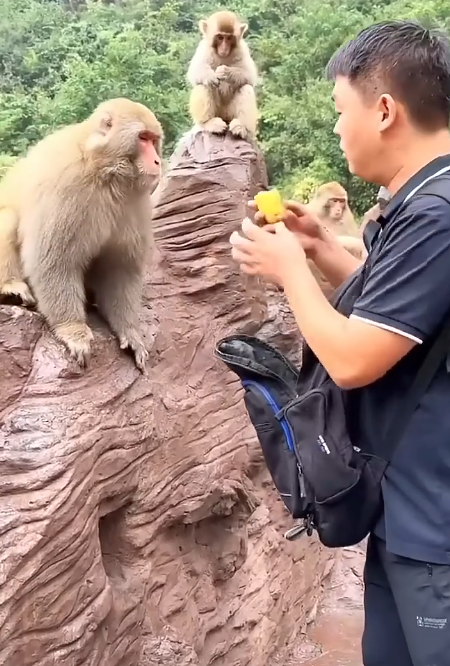
They say a creature that dies filled with pride, cruelty, and mockery cannot pass peacefully into the afterlife. Instead, it lingers, twisted by its own desires. And so the Monkey King became a spirit.
At night, villagers whispered of eerie laughter echoing from the jungle. Travelers spoke of shadows that danced in the trees, shaped like a monkey with burning eyes. Hunters swore that when they lit a fire, they saw a figure juggling flames in the distance.
The spirit of the Monkey King continued his performances, but now they were darker than ever. Those who wandered too close to the jungle at night would hear a mocking voice behind them, only to find nothing when they turned. Sometimes, their belongings vanished, never to be found again. Sometimes, they returned with scratches across their arms, as if clawed by invisible hands.
The forest, once alive with birdsong, grew quiet after dusk. No creature dared perform a sound, for fear the spirit would appear to mock and torment them.
The Warning
The elders of the village gathered once more. They built a shrine at the edge of the jungle, laying offerings of fruit and incense. Not to honor the Monkey King—but to contain him.
“We feed his spirit so he does not feed on us,” they told the children.
But the warning remained clear:
“Do not imitate him. Do not laugh at cruelty. For laughter can summon him, and once he comes, he never leaves.”
To this day, the story of the Monkey King is told as both a tale of caution and a strange kind of entertainment. Children giggle nervously when they hear of his tricks, but they shiver when they learn of his end.
Some say his spirit still roams, watching from the treetops, waiting for someone foolish enough to laugh at suffering.
The Lesson
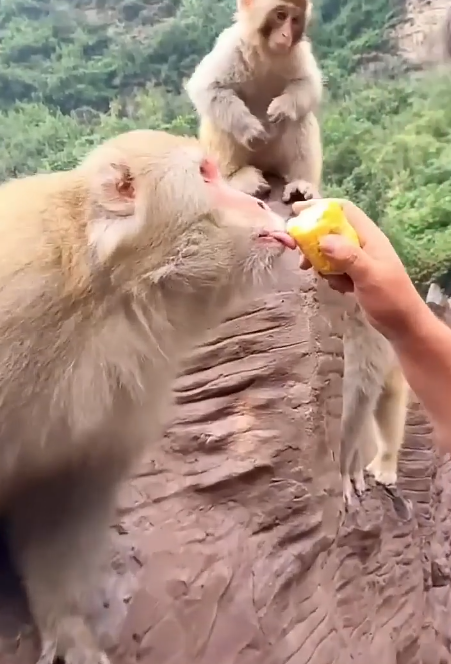
The Monkey King’s story is more than a ghost tale—it is a lesson woven into the fabric of folklore.
Performance is a gift. To bring joy, to spread laughter, to amaze with skill—these are blessings. But when performance becomes cruelty, when laughter is built upon the suffering of others, it warps into something monstrous.
The Monkey King was a showman, yes. He could juggle, dance, and mimic with astonishing talent. But he chose to use his gift for mockery and malice, and in the end, it consumed him. His spirit lingers not as a star of the jungle stage, but as a shadow, a reminder of what happens when talent is twisted by arrogance.
Closing
So if ever you wander through a jungle and hear a strange laughter carried by the wind, remember the tale of the Monkey King. Do not laugh. Do not imitate. Walk away, in silence, and carry the lesson with you:
That even the brightest talent can darken into shadow if used without kindness.
And beware—because somewhere among the trees, a spirit still performs for an audience that dares not applaud.
